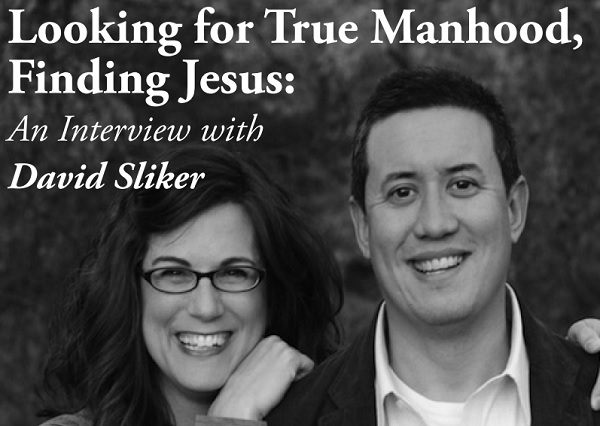Looking for True Manhood, Finding Jesus:
An Interview with David Sliker
By Sloan Milliken

David Sliker is a husband, a father, and a man after the heart of God. He is a leader at the International House of Prayer in Kansas City and a traveling minister. His travels include stops in Taiwan at least twice a year, where he ministers to leaders and youth, equipping them to encounter and to proclaim the beauty of the Lord. I was encouraged to reach out to him to discuss authentic masculinity, and I was refreshed by his insights and the simplicity that comes in knowing Jesus. I hope you enjoy our discussion as much as I did!
David, what did you think true masculinity looked like as you grew up, and what did God use to shape your understanding as you grew in him?
I grew up in the 1980’s, which was a very muscular era of American history. I’d imagine it looked similar to the era in which Teddy Roosevelt was President: men were men, they were strong, and they overcame obstacles and outmuscled and outgunned very obvious, clear-cut enemies. You didn’t see a lot of “grey” in American politics or pop culture in those years. Everything seemed black and white.
As a Christian in a non-Christian home, my father’s masculinity was the old-fashioned Republican brand of southern good ol’ boy. It was a kind of “don’t let them see you cry” or show any kind of weakness. He was a man who took charge, and he was the best that he could be. Ironically, my dad was also a huge sentimental softie who would cry at the end of sad television shows and movies. He was the breadwinner. He ruled the home. Yet, he had a tender side to him that really marked me as a boy.
My Christian friends that I grew up with also fit right in with the guns, wrestling, outdoorsy kind of masculinity of that era. I sort of imported all of my definitions of manhood that I had absorbed from the world around me into my Christianity, without really thinking it through, mostly because it seemed to “work” early on. I could take charge, get things done, and be successful in ministry, so I never needed to question whether or not my definitions were biblical or cultural. No one around me did, either.
Once I became deeply involved in pastoral ministry with youth and young adults, though, I began really having to think through what biblical masculinity looked like. You can lead and serve adults for a long time and never really have your cultural paradigms challenged, but when you minister to young people, you begin to learn over time that the “standard” answers often do not have either real, immediate impact or bear authentic, long-term fruit. You have to find better answers because the information age is empowering young people to think and ask better questions.
I also became very restless and unsatisfied with the depictions of masculinity that I saw throughout the church—in sermons, books, through other ministries, etc. It seemed like the definitions and expected expressions of masculinity were rather cultural and “macho,” and therefore in my mind insufficient to answer the challenges that same-sex attraction and homosexuality were bringing to the church. The kid who wears skinny jeans and likes decorating, baking, and plays can embrace a thoroughly biblical masculinity just as much as someone who enjoys testosterone-fueled, outdoors-situated, and rough-and-tumble activities. So I set out to find my understanding in (1) the knowledge of God and (2) in his word. What does it mean, from his perspective, to be a redeemed, true man?

So, what conclusions did you arrive at? How would you define Biblical manhood?
So, I’ve landed (for now) on this view: I view biblical masculinity primarily through the lenses of:
(1) divine design and “pre-fall” sovereign purpose,
(2) sonship and fatherhood, and
(3) the person of Christ.
By “divine design” I am speaking of the biological (physical and emotional) distinctives that men possess for the pre-fall sovereign purpose of “subduing” or “taming” a wild world and taking a leadership role in building and transforming it. Men were made to conquer, to fight, to serve, and to give. We were made to overcome challenges and steward God’s creation. We were made to expand, to build, and to establish.
There are longings in the human heart from before the fall that aren’t exclusive to men, but were meant to be expressed by men in ways that are a bit different than women. Those longings particularly include the desire for greatness and for impact.
The best expressions of this post-fall are found, by the grace and power of the Holy Spirit, in the way we express true sonship before God and give and serve to make others great— our wives, our children, those we are discipling, etc. We express our desire for greatness and impact in and through Christ by laboring for real change and greatness. As confident sons, we spend our inheritance from the Father to see our family and others around us established in their destiny and future. Receiving and giving a real inheritance of natural wealth and a spiritual heritage are what confident sons who become true spiritual fathers do.
The ultimate picture of this is Christ, best expressed in the manner in which he loves the church: he has been given all power, all honor, all authority, all glory; yet he delights in using none of it for his own good, pouring it all out generously to serve those he loves into true greatness. The most powerful man self-identifies as a slain Lamb. One of his favorite titles is the Servant of All.
There’s much more to be said on the topic—the issues of meekness, strength in weakness, surrendered confidence in his Father’s leadership, the tenderness and gentleness of his heart in regards to how he leads and rules over his people, etc. In all of this every man can find his story and discover a broader masculinity than most cultures allow for. In finding true masculinity in the person and heart of Christ, we also find the true means to love others. In him, we can give extravagantly to fight for their destiny with a free heart, knowing that he fights fiercely for ours.
I love what you’re sharing about finding our stories in the story of Jesus Christ. Can you explain a little more what you mean by that—both what you mean by Jesus’ story, and how a man can find his story in it?
Part of what we forget is that, in the beginning, Adam was the picture of authentic masculinity, because he was made according to what God intended masculinity to be.
Masculinity was intended to be expressed from intimate relationship with God in a garden (paradise, rest), in worship (revelation and adoration), and in mission (conquer and rule the earth). We don’t know what being a true man looks like in that context—it was lost to us at the fall. We lost something, and part of what was tragically lost to us was the true definition and expression of manhood from intimacy with and the knowledge of God.
However, Jesus came, and in him we find what was lost to us in the garden so long ago. He came as a man. Paul called him “the last Adam,” and through him we find the lost picture of true humanity restored in full. Who he was, how he lived, loved, served, and in the days to come, how he conquers and rules all give us this beautiful picture of true manhood in the person of Christ. He lived as a son to Joseph (serving as a carpenter); he lived as a son to his mother (caring for her as a widow). He lived and lives as a father. He is a Bridegroom, a King, and a Judge. He partners with us, serves us, and establishes us in our roles and destinies.
Through the beauty of the gospel, Christ is now “in us” and we are now “in Christ.” This glorious union brings us by grace into his story in the most amazing way. His story is now our story. We can find ourselves in him, and with the grace and help of the Holy Spirit, we can grow into true, authentic masculinity as we come alive in him. What was lost was not just rediscovered, but placed deep within our innermost being and given back to us in the fullest sense possible. Through the gospel, we find our way into Jesus’ story, and in the process, truly find ourselves.

What are some resources or action steps for someone wanting to delve more deeply into this topic?
In terms of growing in this topic, my first and most important piece of advice would be to dive into the details of who Jesus is and what he is like. If he is our picture of true masculinity and biblical manhood, then we have to know him and allow him to define manhood by how he lives, leads, and loves. We’re not trying to conform to an idea of what biblical manhood is according to our own insufficient definitions; we’re being conformed into the image of Christ and becoming like him day by day.
What’s amazing about this truth is that now women can find themselves as well. True femininity can be found in union with Christ, through the liberating power of the gospel that frees both men and women to be who we were truly made to be. We can cling to his voice and opinions as the defining truths that establish who we really are and who we were made to be. While our topic has been discovering biblical masculinity, the true beauty, dignity, and worth of a woman are found through the same exact means. Whether male or female, we find who we were made to be in the heart and love of Christ.
For more from David Sliker, check out his excellent blog at davidsliker.com and grab a copy of his book End Times Simplified: Preparing for the Coming Storm.


 Sloan Milliken is learning to live as a son of his Father in heaven. He resides in Davidson, NC, where he owns a small house painting company. He enjoys playing music and rock climbing, and he puts his English degree to use by doing some editing on the side.
Sloan Milliken is learning to live as a son of his Father in heaven. He resides in Davidson, NC, where he owns a small house painting company. He enjoys playing music and rock climbing, and he puts his English degree to use by doing some editing on the side.